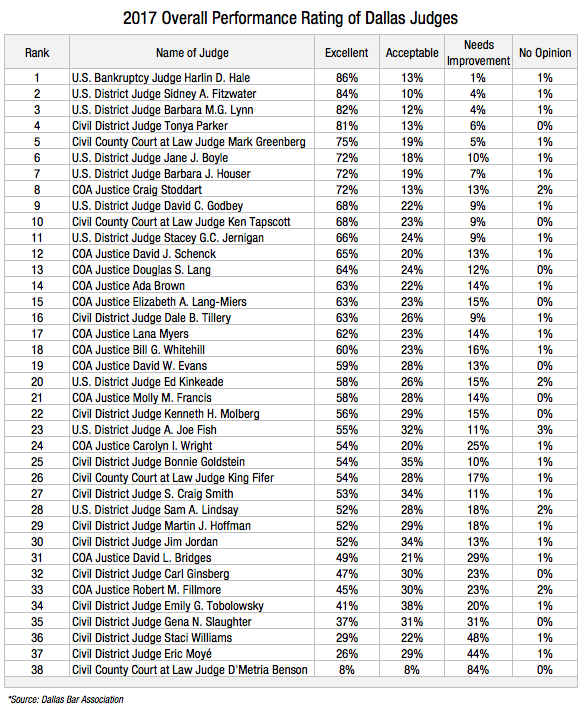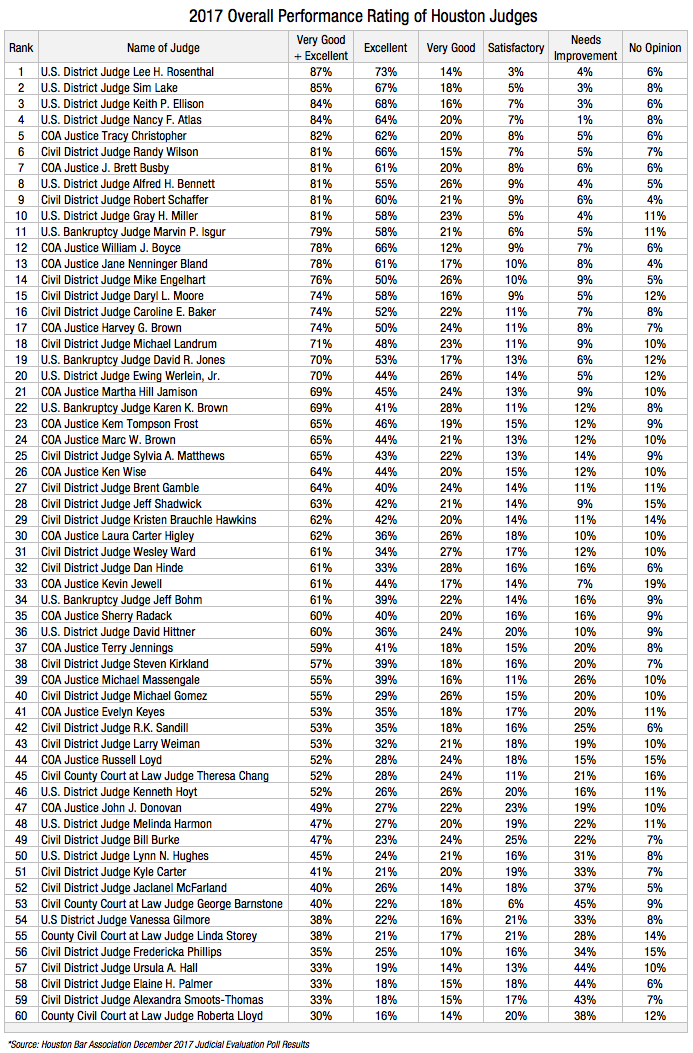In the ongoing Dallas versus Houston rivalry, the Big D seems to have one-upped the Bayou City when it comes to lawyer satisfaction with local judges who handle business matters.
Then again, it depends on how you look at it.
Every two years, the Houston Bar Association and Dallas Bar Association poll their members on the performance of the federal and state judges in the area. The polls are conducted in the years that precede general elections.
The HBA released its poll results last month, while the DBA released its report in May of last year. And when we look at judges who tend to handle business cases, the results are in the eyes of the beholder.
The Dallas survey, for instance, included lawyer ratings on 38 local judges who preside over civil cases—ten of them federal judges, 28 state civil judges. In Dallas, eight of those judges were rated “excellent” by more than 70 percent of lawyers surveyed. In the more recent Houston survey, 60 local judges who hear business cases, only one jurist (U.S. District Judge Lee H. Rosenthal) was rated “excellent” by 70 percent or more.
Likewise, in Dallas, 20 of 38 judges who handle civil matters were rated excellent by 60 percent of lawyers surveyed. In Houston, only 10 of 60 such judges were rated “excellent” by 60 percent or more of those lawyers surveyed. In the Dallas survey, 20 of 38 were rated “excellent” by 60 percent or more.
That said, there is an important distinction between the two surveys that accounts for the difference. In the Dallas survey, the only rating above “acceptable” is “excellent.” In Houston, there are two rating above “satisfactory”—“very good” and “excellent.” And when the two ratings compare categories above average—above “acceptable” and “satisfactory”—the results reflect a similar satisfaction among lawyers in Dallas and Houston. Or maybe even broader satisfaction in Houston.
Look at it this way: In Dallas, 47 percent of judges (18 of 38) are rated better than “acceptable” by 60 percent or more of local lawyers. In Houston, 60 percent of judges (36 of 60) are rated above “satisfactory” by 60 percent or more of those surveyed.
The surveys are also familiar in some of their broader strokes. In both surveys, for instance, federal judges are generally rated higher than state judges; and state appellate judges are generally rated higher than state trial judges.
In Houston, eight of the top 10 civil judges (“very good” or better) are trial judges, state and federal. Six are federal, and all ten are highly-rated by 81 percent or more of those surveyed. In Dallas, eight of the top 10 civil judges are trial court judges, six are federal and all are highly-rated by 68 percent or more.
At the other end of the scale, the results were roughly similar in Dallas and Houston. Nine of the 38 Dallas judges received “needs improvement” marks from 20 percent or more of the lawyers surveyed. In Houston, 16 of 60 judges were rated as needing improvement by 20 percent or more. In other words, in both cities one in every four jurists was rated as “needs improvement” by 20 percent or more of those surveyed.
Of note:
The Houston Bar Association received 1,145 responses, while the DBA received 894 responses.
No matter how the Houston survey is calculated, Judge Rosenthal is rated tops by Houston lawyers.
The worst-rated judge in Houston (County Court at Law Judge Roberta Lloyd) was rated “needs improvement” by 38 percent of lawyers. That said, 30 percent rated Judge Lloyd as “very good” or better, and four other Houston judges were rated as needing improvement by 40 percent or more.
The worst-rated in Dallas (County Court at Law Judge Demetria Benson) was cited as needing improvement by 84 percent of respondents.
Criteria that respondents used to rate state appellate judges included attentiveness and constructive interaction during oral argument, well-written and clearly-reasoned opinions, impartiality when determining legal issues, and judicial temperament.
Criteria for civil district judges included a judge’s ability to issue opinions in a timely manner, impartiality, preparation for hearings and trial, adequate demonstration of knowledge of the law and efficient use of attorneys’ time. The criteria for federal judges was similar, and also asked whether federal judges appropriately used their magistrate judges.


